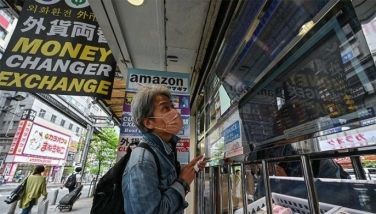ING downgrades earnings forecast for RP banks
May 15, 2001 | 12:00am
Persistent internal risks and external concerns have forced investment bank ING Barings to downgrade its earnings forecasts for the banking sector by 32 percent.
In its latest outlook on listed Philippine companies, ING Barings said its downgrade on earnings forecast of banks was based on reported below-par earnings last year and expectations of industry and stock-specific developments for the year.
ING Barings said that while the series of rate cuts by the government since the start of the year should be favorable for the sector, the demand for loans has yet to pick up.
"Anemic loan demand has forced loan rates down, while the cost of deposits is maintained at constant levels. Unless loan demand recovers or continues to be limited to large corporates, banks could suffer from thinning spreads," ING Barings said.
Despite this, ING Barings sees the banking sector maintaining a 90-percent income growth this year which was based to a weaker base of poor earnings in 2000.
"Primarily, one-off expenses should taper this year following the completion of merger activities and the booking of large non-recurring expenses last year," ING Barings said.
The investment bank added provisions for bad loans could be lower with fewer non-performing loans (NPLs) as the economic outlook improves.
Latest figures, however show sluggish bank loans in February went up resulting in an increase in the NPL ratio to 16.43 percent from 16 percent in January, reflecting in part the overall weakness of the country.
In a recent report on the Philippine banking sector, the International Monetary Fund said the lagged effect of the financial turmoil from October 2000 to early part of January this year could further bring up the industry’s NPL ratio.
Another thing that could impact on the banking sector’s income projections for this year in the recent downgrade in the international credit ratings of three major Philippine banks.
Moody’s Investor Service recently downgraded the ratings of Metropolitan Bank and Trust Company, Bank of the Philippine Islands and Equitable PCI Bank.
Moody’s based its downgrade on what is described as the deteriorating operating environment in the country.
Aside from the three big banks, Moody’s also maintained its lower ratings for Philippine National Bank and Allied Banking Corp. both of which are owned and controlled by tycoon Lucio Tan.
Aside from the banking sector, ING Barings also downgraded the earnings forecast for the manufacturing sector in the wake of the weak outlook for the major markets of local electronics industry.
The perceived slowdown in the US and Japan, two of the major markets for Philippine electronics, is seen to taper the growth of the export of which electronics constitute the biggest share in export earnings.
In its latest outlook on listed Philippine companies, ING Barings said its downgrade on earnings forecast of banks was based on reported below-par earnings last year and expectations of industry and stock-specific developments for the year.
ING Barings said that while the series of rate cuts by the government since the start of the year should be favorable for the sector, the demand for loans has yet to pick up.
"Anemic loan demand has forced loan rates down, while the cost of deposits is maintained at constant levels. Unless loan demand recovers or continues to be limited to large corporates, banks could suffer from thinning spreads," ING Barings said.
Despite this, ING Barings sees the banking sector maintaining a 90-percent income growth this year which was based to a weaker base of poor earnings in 2000.
"Primarily, one-off expenses should taper this year following the completion of merger activities and the booking of large non-recurring expenses last year," ING Barings said.
The investment bank added provisions for bad loans could be lower with fewer non-performing loans (NPLs) as the economic outlook improves.
Latest figures, however show sluggish bank loans in February went up resulting in an increase in the NPL ratio to 16.43 percent from 16 percent in January, reflecting in part the overall weakness of the country.
In a recent report on the Philippine banking sector, the International Monetary Fund said the lagged effect of the financial turmoil from October 2000 to early part of January this year could further bring up the industry’s NPL ratio.
Another thing that could impact on the banking sector’s income projections for this year in the recent downgrade in the international credit ratings of three major Philippine banks.
Moody’s Investor Service recently downgraded the ratings of Metropolitan Bank and Trust Company, Bank of the Philippine Islands and Equitable PCI Bank.
Moody’s based its downgrade on what is described as the deteriorating operating environment in the country.
Aside from the three big banks, Moody’s also maintained its lower ratings for Philippine National Bank and Allied Banking Corp. both of which are owned and controlled by tycoon Lucio Tan.
Aside from the banking sector, ING Barings also downgraded the earnings forecast for the manufacturing sector in the wake of the weak outlook for the major markets of local electronics industry.
The perceived slowdown in the US and Japan, two of the major markets for Philippine electronics, is seen to taper the growth of the export of which electronics constitute the biggest share in export earnings.
BrandSpace Articles
<
>
- Latest
- Trending
Trending
Latest
Trending
Latest
Recommended
November 30, 2024 - 12:00am
November 30, 2024 - 12:00am
November 26, 2024 - 12:00am



























